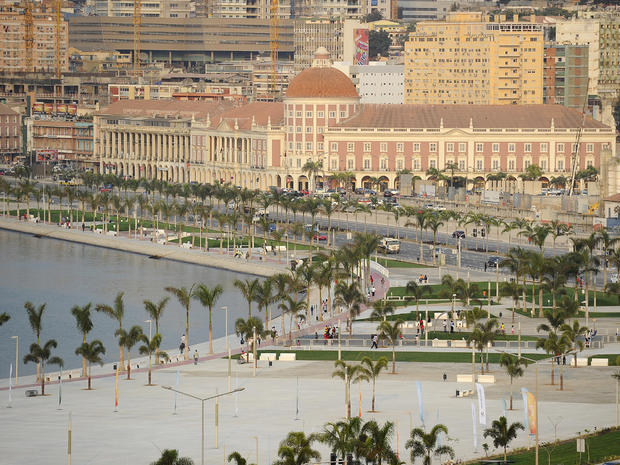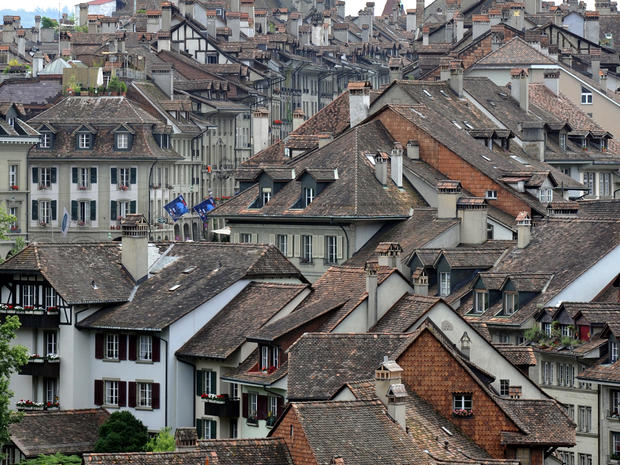Costliest cities for expats
Mercer, the international professional services firm, has released their latest annual cost of living survey, outlining the most expensive cities for expatriates. Top of this year's list is Luanda.
Angola's capital city is also the nation's largest in terms of population. It's also its primary port -- located on the Atlantic coast of southwestern Africa. As the Guardian noted last year, Luanda is "bursting at the seams," thanks in part to economic growth brought on by the burgeoning international oil and diamond markets. Most of the city's five million or so inhabitants live on less than two dollars a day -– but housing is at a premium, as large parts of Luanda are leveled to creating shopping and homes for the affluent.
N'djamena, Chad
Bordered in part by Sudan, Libya and the Central African Republic, Chad is located in a very volatile part of northern Africa. The U.S. State Department recently updated its travel warning for American citizens in Chad, due to continued presence of violent, anti-western extremist groups in the region, as well as growing lawlessness. The Xpatulator.com web site, meanwhile, notes the costs of communication, housing, appliances, hotels, restaurants and education for expatriates remain very high in N'Djamena.
Hong Kong
The former British Crown Colony reverted back to Chinese rule in 1997, but it has it own Special Administrative status, and still remains a major global financial hub. Hong Kong is also one of the most densely-populated cities in the world, and affordable housing there has always been scarce.
Along with its runaway property market and tight living conditions, many of the city's necessities, such as produce and other commodities, have to be brought in from Mainland China or imported from elsewhere, adding to their overall costs.
Singapore
Another former British colony with a well-established financial sector, the city-state of Singapore has never been known as inexpensive. A report earlier this year by the Economist Intelligence Unit (EIU) called Singapore the world's most expensive city. Along with a strong local currency, expatriates must also contend with high housing prices, soaring utility costs and its reputation, according to the BBC, as "the most expensive place in the world to buy clothes."
Zurich
Zurich is the most costly European city for expatriates on the Mercer list. The web site ExpatArrivals.com notes that most households in the city spend between 18 and 23 percent of their income -– and sometimes more -– on rent. Utilities, local taxes, insurances and licenses are also mandatory, and costly. Then again, the cost of living in Switzerland has always been high; the Economist's famous Big Mac Index -– an informal measure of purchasing power around the world –- notes that while a Big Mac burger in the U.S. costs around $4.62, you'd have to shell out $7.14 to enjoy that same Big Mac in Switzerland.
Geneva
While a booming tourist destination, this city is also an expensive place to live -– especially for foreign nationals. Housing is a primary issue. "The Swiss are a population of renters," says the ExpatsArrivals website, which notes that nearly 70 percent of people living in Switzerland are tenants rather than owners. As a result, it adds, "a pointed shortage of apartments in both cities and towns has developed. The situation in Zurich and Geneva is especially stark, and the stiff competition has naturally resulted in sky-rocketing rental prices."
Tokyo
A long-time contender on any list of the world's most expensive cities, the Japanese capital has actually dropped four places in the Mercer rankings compared to last year. Nathalie Constantin-Métral, a principal at Mercer who also compiled the survey rankings, notes Japanese cities overall were lower down on the list this year, primarily due to the yen's weakening against the U.S. dollar. But as in many other densely-packed financial hubs, Tokyo residents have to contend with high housing, utility and food prices, along with other related costs.
Bern
Switzerland's capital also has the dubious distinction of being the third Swiss city to make the Mercer list. As with Zurich and Geneva, expats in Bern must contend with costly and mandatory fees on insurance, taxes and utilities -- while scrambling to find affordable places to live in a very tight housing market.
Another big factor is the overall Swiss economy. "Switzerland remains one of the most expensive locations for expatriates," notes the Mercer report, "following the slight strengthening of the Swiss franc against the U.S. dollar."
Moscow
A sharp depreciation of the Russian ruble against the U.S. dollar, especially in the wake of the recent Ukrainian crisis, has apparently helped to push the Russian capital several places lower on the Mercer list -- down from number two in 2013. But still, Moscow is far from cheap. The web site ExpatArrivals.com notes that housing prices in the city "range from the expensive to the exorbitant."
Expatriates also note that, along with housing, costs for clothing and electronics can also be dear, although food and public transportation remain relatively inexpensive.
Shanghai
China's second city is also an essential part of the nation's burgeoning economy -– and a major global hub for trade, industry, electronics and shipping. It also has high costs for housing, as expats compete for space with China's growing middle class population. Imported goods are also at a premium, according to the expat-centric EnterShanghai.com website: Homesick foreigners can pay up to $8 for a packet of standard, western breakfast cereal.
Mercer notes that major Chinese cities like Shanghai, Beijing and Shenzhen have all risen in its rankings, due in part to the strengthening of the Chinese economy as well as the Chinese yuan against other currencies.









